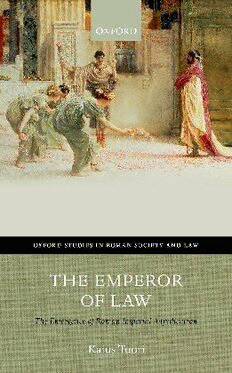
The Emperor of Law: The Emergence of Roman Imperial Adjudication PDF
Preview The Emperor of Law: The Emergence of Roman Imperial Adjudication
OXFORD STUDIES IN ROMAN SOCIETY AND LAW GeneralEditors PAULDUPLESSIS THOMASA.J.MCGINN OXFORD STUDIES IN ROMAN SOCIETY AND LAW The aim of this monograph series is to create an interdisciplinary forum devoted to the interaction between legal history and ancient history, in the context of the study of Roman law. Focusing on the relationship of law to society, the volumes will cover the most significantperiodsofRomanlaw(uptothedeathofJustinianin565) so as to provide a balanced view of growth, decline, and resurgence. Most importantly, the series will provoke general debate over the extenttowhichlegalrulesshouldbeexaminedinlightofthesociety which produced them in order to understand their purpose and efficacy. The Emperor of Law The Emergence of Roman Imperial Adjudication KAIUS TUORI 1 3 GreatClarendonStreet,Oxford,OX26DP, UnitedKingdom OxfordUniversityPressisadepartmentoftheUniversityofOxford. ItfurtherstheUniversity’sobjectiveofexcellenceinresearch,scholarship, andeducationbypublishingworldwide.Oxfordisaregisteredtrademarkof OxfordUniversityPressintheUKandincertainothercountries ©KaiusTuori2016 Themoralrightsoftheauthorhavebeenasserted FirstEditionpublishedin2016 Impression:1 Allrightsreserved.Nopartofthispublicationmaybereproduced,storedin aretrievalsystem,ortransmitted,inanyformorbyanymeans,withoutthe priorpermissioninwritingofOxfordUniversityPress,orasexpresslypermitted bylaw,bylicenceorundertermsagreedwiththeappropriatereprographics rightsorganization.Enquiriesconcerningreproductionoutsidethescopeofthe aboveshouldbesenttotheRightsDepartment,OxfordUniversityPress,atthe addressabove Youmustnotcirculatethisworkinanyotherform andyoumustimposethissameconditiononanyacquirer PublishedintheUnitedStatesofAmericabyOxfordUniversityPress 198MadisonAvenue,NewYork,NY10016,UnitedStatesofAmerica BritishLibraryCataloguinginPublicationData Dataavailable LibraryofCongressControlNumber:2016937253 ISBN 978–0–19–874445–0 PrintedinGreatBritainby ClaysLtd,StIvesplc Matri optimae Preface This book began with a curiosity concerning the contradictory accounts of imperial adjudication, where the same emperor might appear at one moment as a most diligent judge issuing refined legal opinions,andaraving,murderouslunaticatthenext. Manypeoplehelpedmealongthewayinthisinquiry.Asaresearch project,itstartedoutasasideprojectduringapost-doctoralperiodat New York University in 2007–8 (funded by the Hauser Research ScholarProgram,theKoneFoundation,theOsk.HuttunenFounda- tionandtheASLA-FulbrightGraduateGrantsProgram).InHelsinki, parts of the project were presented at different ancient history, legal history,andclassicsworkshopsandcolloquia.Withfundingfromthe EmilAaltonenFoundation,aresearchprojectwassetuponissuesof public and private in the Roman house, where I was able to develop the book idea with Laura Nissin, Juhana Heikonen, Heta Björklund, andSamuliSimelius,usingtheprojectasasounding-board,especially for my ideas of the emperor moving between the public/private dichotomy. I would like to thank Juhana Heikonen for producing theillustrationsforthisvolume. The book project took centre-stage in 2011, as the Academy of FinlandwasselectedmeasanAcademyResearchFellow.Fundedin part by the Foundation’s Post-Doctoral Pool, I returned to NYU in 2012–13,whereMichaelPeachinwasmygracioushostattheClassics DepartmentandLarissaBonfantewaskindenoughtolendheroffice tome.AtNYU,inadditiontoMikeandLarissa,Iwouldliketothank Benjamin Straumann for our innumerable dinners and discussions, BillNelsonandDanHulseboschforwelcomingmetotheNYULegal History Colloquium, and to the faculty and graduate students at the Classics Department for their warm welcome and friendship. Mike and Benjamin would read the manuscript in its different iterations andoffertheirconstructivecriticisms,forwhichIamthankful. Back in Helsinki, I was fortunate enough to spin off a part of the projectasaEuropeanResearchCouncilproject(ERCprojectFound- Law,n.313100),enablingmetogathermyownresearchgroup.Jacob Giltaij, Tommaso Beggio, and Ville Erkkilä have had the dubious viii Preface benefit of reading the chapters and debating them in our meetings. I would like to thank them for their comments and criticism during themakingofthisbook. As the work progressed, I pitched the book to OUP, where series editors Paul du Plessis and Tom McGinn worked tirelessly to improve the ideas and their execution. I remain very much in their debt for making this a better book. My editors Charlotte Loveridge and Georgina Leighton have borne the usual queries for extensions andmorewordswithpatienceandprofessionalism. Partsofthisstudywerepresentedatdifferentconferencesoverthe years(AAH,ASLH,SIHDA,tomentionjustafew),aswellassmaller colloquia such as the NYU Legal History Colloquium or the Tvär- minne Late Antiquity workshop. For all of these events, I am ever gratefultoallthosewhotookthetimetoreadmywork,listentothe presentations, and give their comments. Many others, like Detlef Liebs, gave valuable insights and advice along the way. The book hasbeenimmenselyimprovedasaresult. This book has three academic homes: Helsinki, New York, and Rome. In Helsinki, the numerous legal historians have been my primary reference group and commented on my work on many occasions. Janne Pölönen, my co-conspirator in the Finnish study ofthehistoryofRomanlaw,notonlysharedhiswideknowledgebut also read the manuscript in full. Joonas Sipilä gave freely from his extensive knowledge of Roman administration, Kai Juntunen from his studies on Dio. Professor Carlo Lo Zio gave his insights on the legal implications of concentrated sovereign power. In Rome, the Finnish Institute in Rome at the Villa Lante has been not only a place to stay but also an academic home. Much of the research literature came from three wonderful libraries, the École Française de Rome, the American Academy in Rome, and the Roman Law LibraryatLaSapienza. A note on translations and literature: I have used widely available editions and translations, on some occasions amending an existing text.Wordlimitshavemadeitimpossibletocompilecomprehensive lists of all literature, but I have attempted to include references to worksthatallowthereadertohaveanunderstandingoftheliterature. Help in the research and editing process was provided by Laura Nissin, Phil Katz, Ville Erkkilä, and Heta Björklund. Of those, Heta Björklunddidthebruntoftheworkofeditingthetextandthenotes to house style and preparing the bibliography and the list of cases. Preface ix Thank you! Margot Stout Whiting ably corrected my English. Nat- urally, the responsibility for the views and errors in this book is entirelymine. Thisbookisdedicatedtomymother,whoremainsconfidentthat Iwilleventuallygetarealjob. KaiusTuori Helsinki 15January2016
